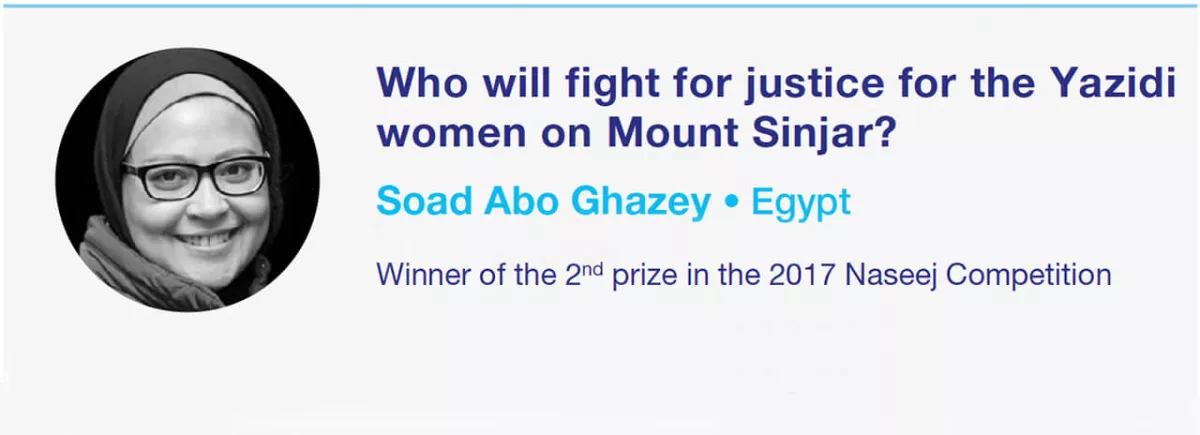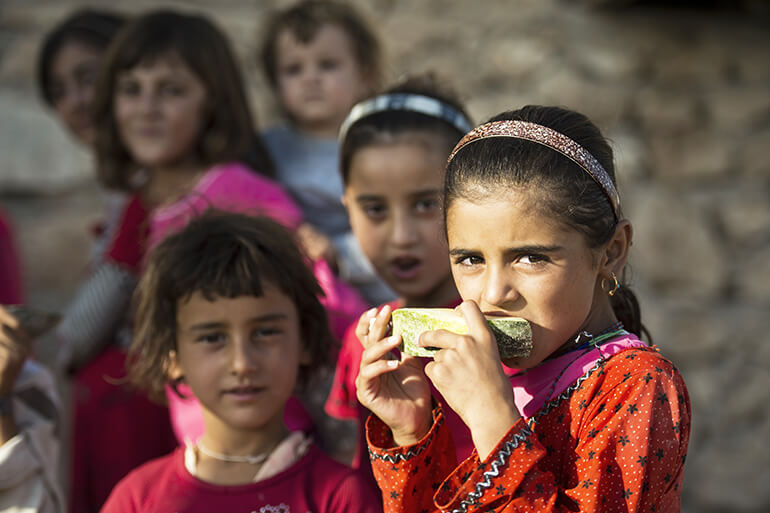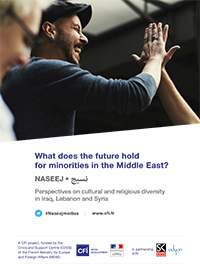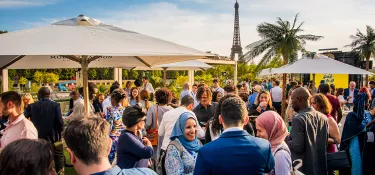
Who will fight for justice for the Yazidi women on Mount Sinjar?
Related project
NaseejDiscover a selection of the best articles dealing with cultural and religious diversity in the Middle East, entered in the Naseej competition launched by CFI and SKeyes in October 2017.
This week, the winner of the 2017 Naseej Prize, the iraqi journalist Safaa Khala, reports on the recent liberation of Mosul by focusing on the future that awaits it.
Published in Akad News on August 29, 2017.
The Iraqi Ministry of the Interior has apologised to the Sudanese civilian, Musa Al-Bashir after he was tortured by the police, and has granted him Iraqi citizenship, knowing he had spent 25 years in Iraq without being able to obtain it. The police officers who were seen beating him in the video have been arrested. According to the ministry, the officers had apprehended him because they thought Mr Bashir was a member of the Islamic State organisation (IS).
Will the Iraqi citizenship granted to him be able to restore his dignity, following the torture he suffered? Doesn't justifying the conduct of the police officers and judging whether or not membership of IS might merit such aggression make the case more complicated? Irrespective of these questions, the behaviour of the Iraqi Ministry of the Interior is still a good initiative that leads me to wonder whether it could widen its apologies and include in them all Yazidi citizens who have suffered all manner of violation at the hands of IS since 2014, right up to the announcement of the defeat of Daesh at Mosul, last July.
There is a subtle but solid link between Egypt and what happened to the Yazidis in Iraq. This link was evident even before the visit by the Yazidi activist, Nadia Murad and her interview with the Egyptian President, Abdel Fattah el-Sisi last December. In fact, she had asked to meet the ulema (religious scholars) of Al-Azhar to explain to them about all the horrendous acts of violation committed by IS against religious minorities in Iraq and, notably, the crimes against humanity committed against the Yazidis on Mount Sinjar.
It was important for Nadia Murad to come to Egypt and meet the president and the ulema of Al-Azhar, especially following the criticisms directed at the fatwas issued by the Egyptian Islamic institution's scholars regarding authorisation of “sex slavery". The Islamic researcher and lawyer, Ahmad Abdou Maher, in a broadcast on the Egyptian channel, Dream, also talked about the programmes taught at the Al-Azhar University, defending the right of the Muslim military commander to order female prisoners to satisfy the sexual demands of his soldiers.
This opinion was also expressed in 2014 by the comparative law professor at the Al-Azhar University, Dr Souad Saleh, in her programme called "Fiqh al Nisa" (Islamic Jurisprudence for Women), where she approved the principle, " women whom your right hand possesses", a principle that existed prior to Islam and that has been regulated by Islam. And Dr Saleh added: "If we fought Israel and won, we then have the right to enslave the Israeli females captured during the war and abuse them sexually".
These two opinions appeared in an article on "the extremist thinking of Al-Azhar", published by the Washington Institute for Near East Policy in March 2016, so about two years after the Daesh terrorist attacks on religious minorities in northern Iraq.
We cannot ignore the date they first appeared: that was 2014, therefore at the start of the acts of violation committed against Iraqi Yazidis. It is therefore easy to find a solid link between these opinions and Daesh's acts of assault on the Yazidi women.

We can deduce, then, that Daesh replaced the "Israel" of Dr Souad Saleh's fatwa with the Yazidis in the northern Sinjar region and that it treated those Yazidis following the example of Arab combatants who, in the past, having triumphed over neighbouring tribes, would share out the women between themselves, just as they would share the spoils of war. But with one simple difference: this act is now classed as sex slavery and constitutes a violation of human rights.
At the same time, it is true that the leaders of Daesh in Mosul did not watch Dr Souad Saleh's "Fiqh al Nisa" programme. However, what she expressed is also found in religious texts and it would be easy to regard it as a justification for all the violations perpetrated by the terrorists in Mosul and throughout the world. What I strongly denounce, however, is the affirmation of these opinions without any possibility of critical debate, knowing there to be much proof regarding the protection of minorities by Islam and of laws protecting human rights, clearly opposing the opinions of the Al-Azhar scholars. We are saddened and extremely embarrassed by the fact that Egyptian voices have supported, albeit indirectly or unwittingly, the violations against Yazidi men, women and children in Iraq.
Moreover, many Egyptians did not feel concerned by what happened on Mount Sinjar, in northern Iraq. Many of them did not even know about this community called "Yazidi". For my part, following the visit to Egypt by the activist, Nadia Murad, her case intrigued me and I began following news stories about her. I carried out research on her community, her story and what happened to her and other women in Iraq from August 2014 onwards. I came across horrendous stories, recorded by international human rights organisations, newspapers and press agencies. However, what I found shameful was that the case in question did not receive the attention it deserved, either in Iraq or in any Arab country, or even within the international community and, in my opinion, the causes remain "mysterious". I could perhaps liken this case to that of the Baha'i community in Egypt, who suffer ignorance, aversion, a lack of protection and deprivation of their civil rights. But what happened to the Yazidis is even more terrifying and more dangerous. Even after the liberation of Mosul, there is no sign of any serious, continued effort being made to ensure the rehabilitation of the victims as well as their compensation and reintegration, in order for them to be able to move forward. Moreover, no measures have been taken to guarantee there is no further repeat of these atrocities in future.
What happened with the Yazidi women in Iraq?
Amnesty International published a report entitled " Escape from hell. Torture and sexual slavery in Islamic State captivity in Iraq". This report was published a few months after Daesh seized the town of Sinjar in northern Iraq, when the terrorist organisation killed hundreds of men and forced others to convert to Islam on pain of death. The girls and young women were separated from their guardians and members of their family – some of them just 12 years old – before being sold as slaves, given away or married by force to IS fighters and their allies. Many of them were tortured, maltreated, raped or forced to convert to Islam.
What these women suffered is exactly what the leaders of the Yazidi community feared. That is why they had asked the Kurdish forces to bomb two schools in Tal Afar and Mosul that the terrorist organisation was using as temporary prisons for the women, stating that " it would be better to see our women die with dignity than for them to live as captives, humiliated and violated." One year after that crisis, in November 2015, a mass grave was discovered containing the remains of 80 women aged between 40 and 80 whom the IS group had executed.
The United Nations Secretary-General's Deputy Special Representative for Iraq, György Busztin, estimated the number of Yazidis abducted by Daesh as 6,417 of whom 3,369 are still in captivity (1,436 women and girls, and 1,733 men and boys). Mr Busztin declared that the Yazidi women and those belonging to other minority communities in Iraq, have been " victims of violations and abuses of international human rights law and violation of international humanitarian law". These comments were made at the commemoration of the third anniversary of the "Yazidi tragedy at Sinjar", during which he called for the Iraqi government to lend its support to the judicial authorities and police to "conduct the necessary investigations" and prosecute the criminals and those who violate human rights. Unfortunately, that has still not been taken into account by the authorities, given the celebratory climate related to the liberation of Mosul from the hands of Daesh.
This matter is not just a case of "local negligence". Everything leads one to believe that the international community too is "negligent" in regard to the Yazidi women. In fact, a few months prior to the liberation of Mosul, Amnesty International had declared that " There is currently no unified system set up to assess the needs of survivors of IS captivity". Amnesty International has also called for more effort to be made to ensure the necessary care and support for these women, so that they can rebuild their lives.
As for the Iraqi government, the above-mentioned Amnesty report, published in October 2016, called for the government, in the event of it taking this matter "seriously", to try the IS organisation. It needs to ratify the Rome Statute of the International Criminal Court which grants the tribunal a legal mandate regarding all war crimes committed during the conflict. It must also draft a reform concerning the justice and security sectors in accordance with state standards, while taking into account the need to preserve evidence of the flagrant violations of human rights until the Yazidi victims get their dues in terms of justice and compensation.
Observers of all the movements for justice in this matter note the latter's unregulated, almost "chaotic" aspect. No unified plan has been put in place either, whether at local, international, government or family level. The matter in question might well have an unsatisfactory outcome for the survivors of the crimes committed by Daesh. Over time, and with the celebrations surrounding the liberation of Mosul, this whole matter risks being forgotten about or regarded as "secondary". Priority might be given to reconstructing the regions that were ravaged and destroyed during the process of liberation. However, it is the re-establishment of justice and reparation for the Yazidi women that must constitute the absolute priority. There is a fear, in short, that the matter is controlled by "communalism", and in this actual case, this fear remains both legitimate and realistic in equal measure.
In other respects, the glimmer of hope that makes us optimistic about the ability to unify efforts to obtain justice for the Yazidis lies in the coordinated movements that allowed Mosul itself to be liberated. The celebrations over theliberation of Mosul might perhaps constitute, in part, a "symbol of national unity", as the Kurdish Peshmerga forces fought alongside the Iraqi army and other irregular units, such as the popular forces and fighters from Sunni tribes, in the aim of liberating Mosul from the Islamist group. That group held the city in an iron grip and had caused severe damage to religious and ethnic pluralism in the city.
All those crimes committed by the IS organisation against the Yazidis at Sinjar are war crimes: sexual violence, captivity, forced religious conversion, murders, incarceration and deprivation of liberty, as well as all behaviour forming part of "sex slavery" require urgent intervention for the sake of justice.
The moment of "liberation" arrived after three years, and three years of waiting are more than enough for all parties to decide to commit to rendering justice and applying the laws, by cooperating to compensate and atone for all the harm suffered by the Yazidi women.
Find the ten finalists of the
Naseej competition in theWhat does the future hold for minorities in the Middle East?



